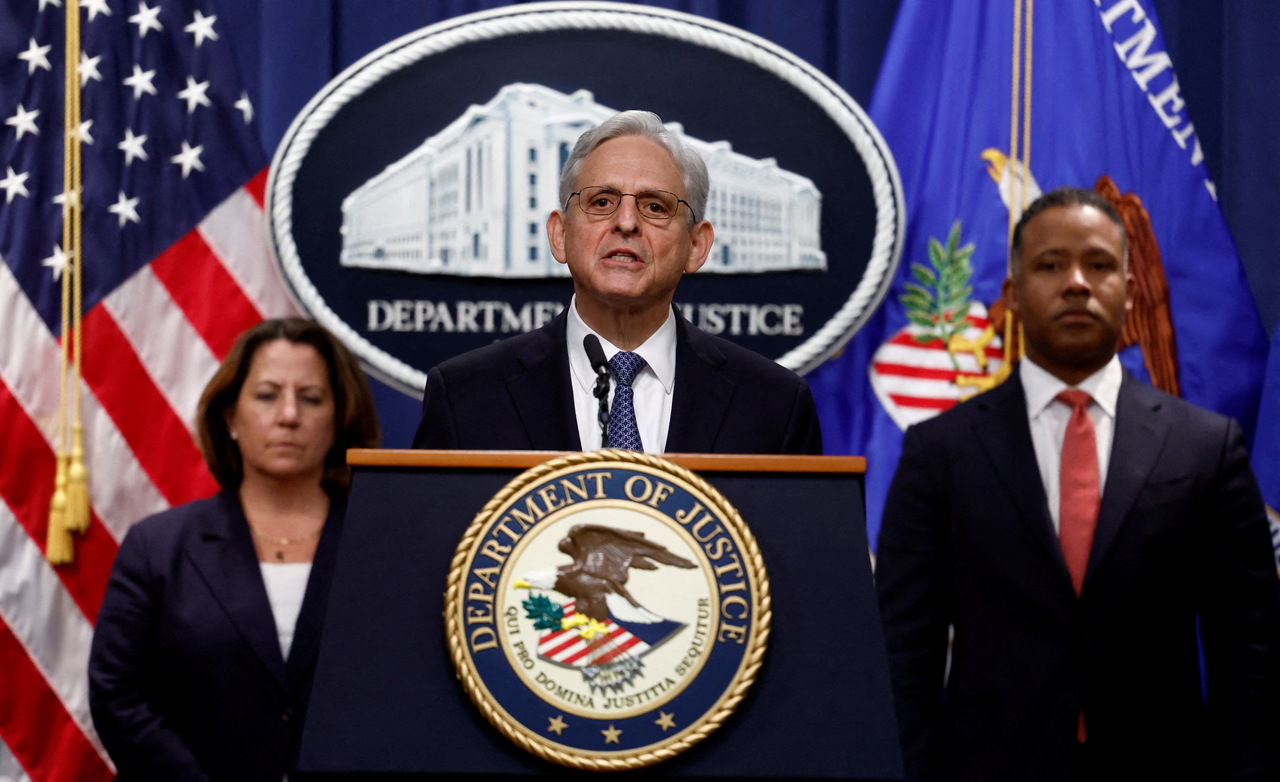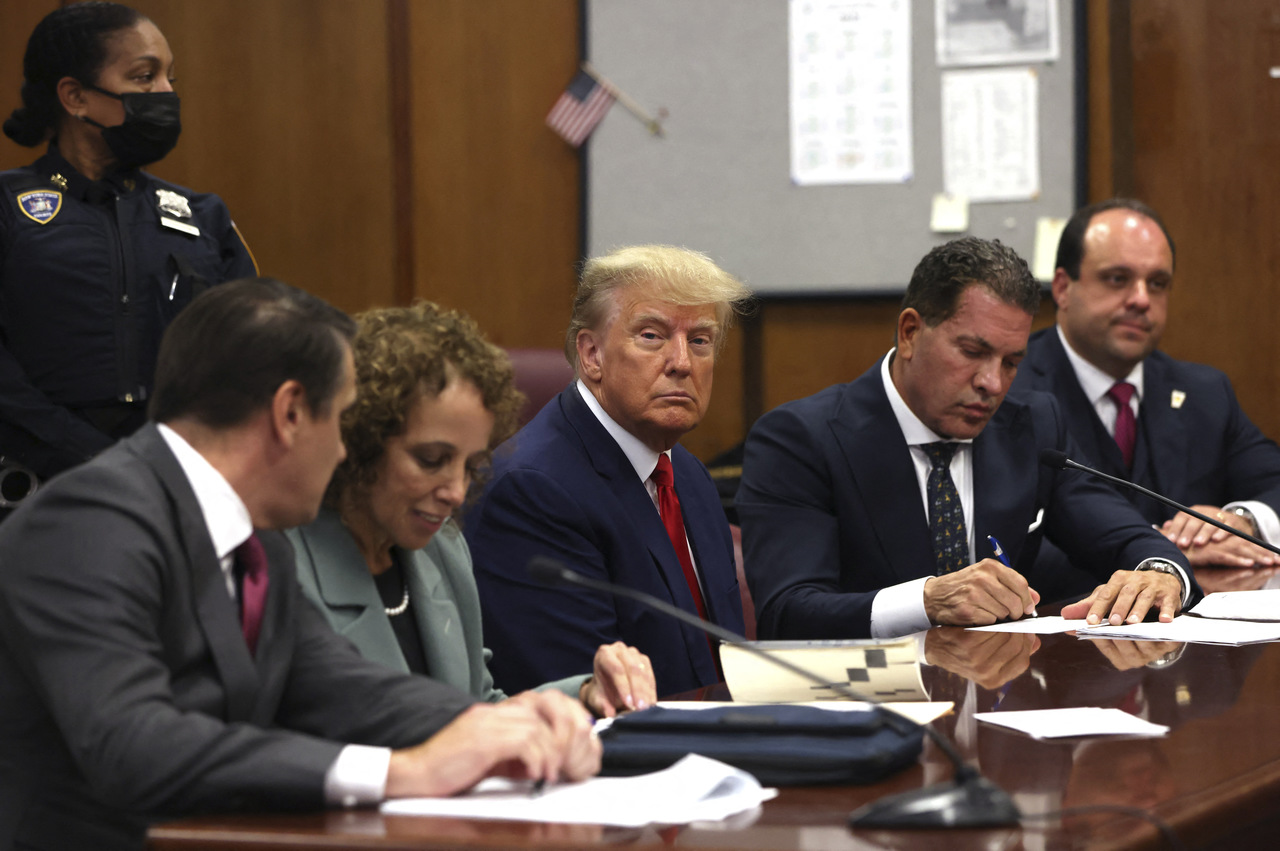What is the Probable Impact of Trump's Legal Problems on His Candidacy?
Former U.S. President Donald Trump faces charges in four criminal cases but is nonetheless the leading candidate seeking the Republican Party’s nomination ahead of the 2024 presidential election. One or more guilty verdicts in the individual cases would carry serious legal consequences—including potentially imprisonment—but will not formally prevent him from running for or even taking office. Hoping to win election, Trump is likely to seek to drag out the cases to gain immunity.
.jpg) KEVIN FOGARTY/Reuters/Forum
KEVIN FOGARTY/Reuters/Forum
Special Prosecutor Jack Smith has brought criminal charges against Trump in two ongoing federal criminal cases involving his retention of classified documents after his presidency and his attempt to influence the outcome of the lost 2020 election. At the state level, Trump was indicted in New York state in April on charges of falsifying company documents, and in August in the state of Georgia, also in connection with election interference. Besides the criminal complaints, there are three civil lawsuits pending against Trump in New York alleging harassment and defamation, inflating the value of the company, and a class-action suit asserting he gained from a financial pyramid scheme.
Since announcing his run for the presidential election in November 2022, Trump remains the leading candidate seeking the Republican Party’s nomination. In August, his support among Republican voters in national polls averaged 52.7% (nearly 40 percentage points, p.p., ahead of the other 10 candidates). In a simulated presidential election poll, his candidacy was supported by 43% of those surveyed—the same percentage as Joe Biden.
Charges and Possible Punishment
A total of 40 charges were brought against Trump in June and July in the case of the classified documents. Most of them (32) relate to deliberately withholding information vital to national security and each carries a penalty of up to 10 years in prison. The others relate to obstructing an investigation (6), including by destroying evidence and giving false testimony (2). The stipulated range of punishments for these crimes includes a fine and/or imprisonment of up to 20 and five years, respectively. In connection with the allegations of tampering after losing the election, Trump was charged in August with four counts: conspiracy to commit a crime against the United States (to influence the outcome of an election), conspiracy to obstruct official proceedings and obstructing or attempting to obstruct an official proceeding (certification of electoral votes by Congress), and conspiracy to restrain (electoral) rights. The penalties for these charges are, respectively, up to five years in prison, up to 20 years for both charges related to the certification of votes, and up to 10 years for the restriction of rights. The former president also faces a fine and up to four years in prison for each of the 34 charges of falsifying documents in New York. In Georgia, Trump (and 18 other defendants) were charged with racketeering under the RICO Act. That law allows prosecutors in selected crimes committed by multiple defendants to be linked together, and the stipulated sentence is up to 20 years in prison. The former president faces 12 additional charges of interference in the electoral process and obstruction of justice. None of the penalties carries a ban on taking public office, let alone running for it.
Formal and Legal Challenges
In the past, there have been instances of candidates who have been convicted and were serving prison sentences running election campaigns. However, there is no precedent for convicting a former president, and the indictment of Trump was already the first of its kind in U.S. history. The subsequent charges are being presented by Trump and his supporters as political attacks and an attempt by the Biden administration to unfairly influence the election. The key dates of the election cycle (the start of the Republican primary on 15 January 2024; the party convention on 15 July, at which the winning candidate receives the nomination; the presidential election on 5 November) are forcing prosecutors to seek speedy trials to reduce their impact on the electoral process. At the same time, the significant number of cases means they must be staggered so as not to interfere with each other. The dates of the start of hearings in the civil lawsuits are for 2 October 2023 (harassment and defamation), 15 January 2024 (overstatement of goodwill), and 29 January (class-action). The criminal trial on falsification of documents in New York will begin on 25 March, while the trial on detention of secret documents will begin on 20 May. Prosecutors in the federal case, to not influence the outcome of the election, are reportedly seeking a 2 January date, which is before the primaries begin. The prosecutor in Georgia has declared that she wants to start the trial there within six months (i.e., by mid-February 2024).
Trump will seek to postpone the trial dates and, if found guilty, file appeals, making it less likely that final verdicts will be rendered before the election. If Trump wins the election and the cases are not resolved by the time he is sworn into office in January 2025, they will in effect become moot and suspended, as an incumbent president, per traditional policy, cannot be indicted and convicted. In the federal cases, Trump as president could order his appointed attorney general to close them so they do not resume after his term in office ends. He could also pardon himself, although that decision would be challenged in court and likely require a Supreme Court ruling. In the New York and Georgia cases, Trump could not, however, pardon himself or order the termination of any pending criminal cases as these are state government powers. He may seek to transfer them instead to the federal level by invoking provisions that allow for a change of jurisdiction in lawsuits involving federal officials arising from their office. The chance of success of such actions are slim, though.
Electoral Implications
The numerous court cases and their staggered timing will provide Trump with constant publicity, drawing attention away from other candidates vying for the Republican Party nomination. At the same time, he will be forced to adjust his campaign schedule to accommodate the hearings, making it difficult for him to hold election rallies and potentially preventing him from participating in the debates. In the case charging him with influencing the outcome of an election, Trump was barred from contacting witnesses, which could be a complication for his campaign as some of them hold key positions as campaign advisors. While the indictments so far have not diminished Trump’s probability of winning primaries (and some polls have shown an increase in support after further allegations), they are viewed differently by the broader electorate. In one poll, those surveyed attached high importance to the allegations of falsifying business documents (52%), the retention of government documents (61%), and influencing the outcome of an election (65%).
Conclusions
Given the wide range of charges against Trump and at least 18 of his associates, the Georgia case is likely to bring the most serious legal consequences. Criminal charges against Trump are perceived by most of the public as serious, but even if the former president is convicted it is not a formal obstacle to him continuing to campaign. Trump’s legal problems are likely to be one of the leading campaign themes. While they will not completely devalue the importance of economic or ideological issues, they may further lower the profile of foreign and security issues unless they are linked to domestic political rivalries, such as the issue of aid to Ukraine. In the event of conviction and a Trump presidential election victory, the situation would require Supreme Court involvement and resolution. It also would force a response from representatives of both parties in Congress and lead to an even greater polarisation of American society, an increase in social tensions, and potentially even an outbreak of unrest similar to the May-June 2020 protests or the 6 January 2021 riots.
There is little chance of reversing voter preferences among the Republican electorate, as most of them perceive the allegations against Trump as politically motivated. Conviction in any of the cases could even encourage some remaining Republicans to back his candidacy, resulting in a strengthening of Trump’s position in the primaries. In the broader perspective, however, a conviction may discourage a wider group of voters, not least because of the formal-legal uncertainty surrounding the potential tenure of a convicted president. The most realistic possibility of limiting Trump’s political ambitions is the rejection of his candidacy by voters in the November 2024 election.





